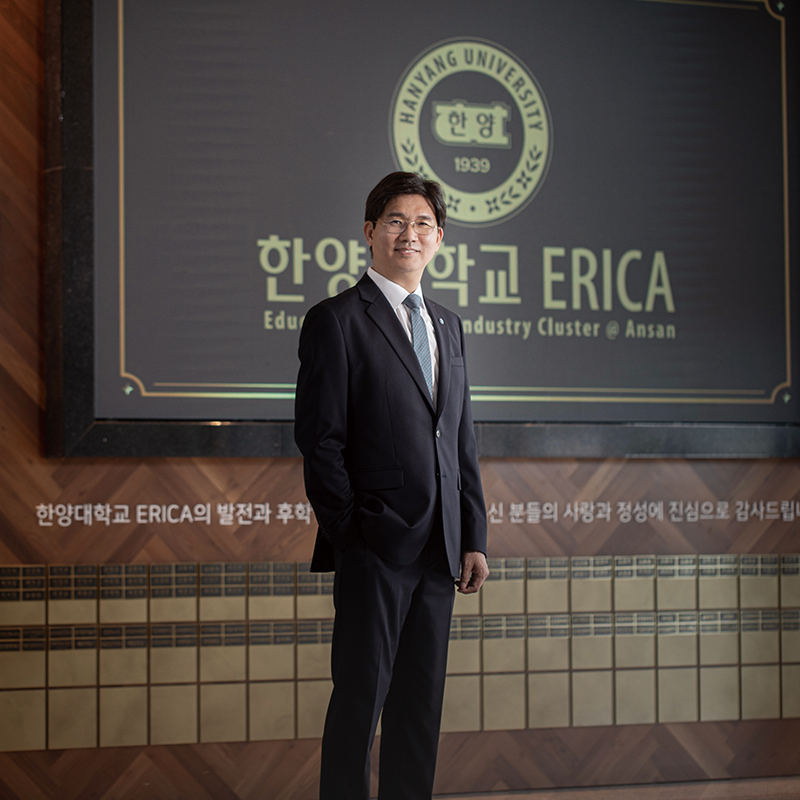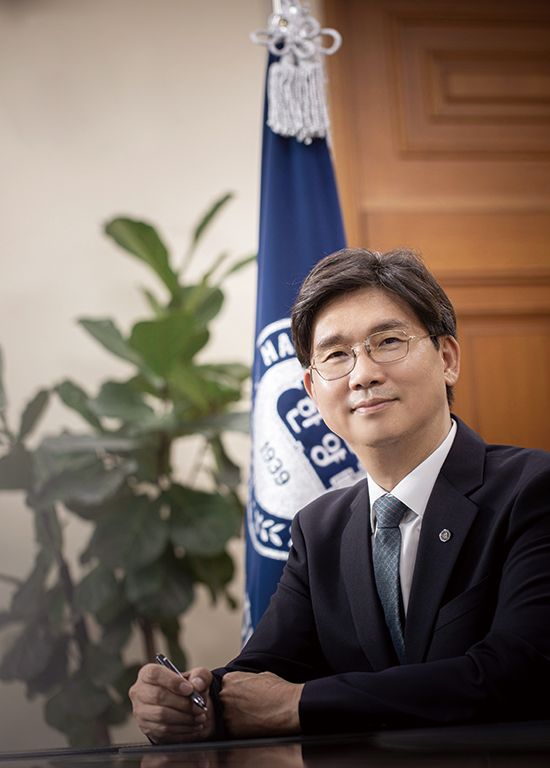Special Interview Ⅰ
Preparing for
Sustainable Growth
Dong-hyun Baek, New Vice-President,
Hanyang University ERICA Campus
ERICA celebrates its 44th anniversary this year. If the campus were personified, we could say it is the leader in its field(s) and has achieved quite a number of impressive accomplishments. Just as successful leaders owe their success to their supporters, any great organization can likewise trace its progress to its leadership. In this regard, expectations are high at ERICA as all eyes on campus are on its new leader, recently appointed to continue building upon ERICA’s advancements.
The campus has a history of innovation and success achieved by actively responding to societal changes. New Vice President Dong-hyun Baek promises to continue on the path following ERICA’s vision through cooperation and communication.
- Written by · Yeon-joo Lee
- Photo by · Cho-won Son

Q. First, we would like to sincerely congratulate you on your appointment as ERICA’s new vice-president.
It is a great honor to have the opportunity to help shape the education and research fields here at ERICA. As you know, ERICA is Korea’s representative industry-academia cooperation research university, and has numerous achievements based on its excellent research activities and education programs. I would like to take this opportunity to thank former Vice-President Hanseung Lee and all members of ERICA for their individual and collective efforts which are helping to ensure that ERICA’s successes continue. I pledge to do my utmost to fulfill ERICA’s visions and goals together with the members of the university through close communication, and I will endeavor in earnest to promote education, research, and the university welfare by adopting various ideas.
Q. Being employed by the School of Business Administration at ERICA since 2004, you have been appointed to various important positions, such as director of the Planning & Coordination Office, director of the Management Audit Office, dean of Academic Affairs, and dean of the College of Business and Economics. During this time, what were your most significant achievements that contributed to the growth of the university?
What I remember the most is that I took charge of business as the head of the PRIME Project while I was the dean of Academic Affairs. The PRIME Project was the largest university support project designed to improve the structure of universities through autonomy and strengthen students’ career prospects by helping them improve their capabilities, based on societal demands.
At the time, ERICA was selected for this large project which was highly coveted, even though the number of our students involved for the restructuring plan was significantly lower than other universities. We received a total of KRW45 billion in support over three years. The catchphrase ERICA presented for the PRIME Project was the “3S UP” strategy. The key was to develop software capabilities, upgrade cutting-edge scientific technology, and advance the smart manufacturing field, focusing on “Software Up,” “Science Up,” and “Smart Up.” Through this project, we were able to launch our hightech departments, including the College of Computing, the Department of Phototonics and Nanoelectronics, etc. We were also able to reorganize our open spaces and PBL rooms in each college. IC-PBL learning was also introduced through the PRIME Project. I remember in particular, that I met with professors, students, and alumni of the departments for restructuring and explained the purpose and the necessity of the project over a period of seven months. Reaching consensus with other staff members through communication was a very valuable achievement.
I can also mention serving as the first director of the Management Audit Office (currently the Audit Office). During former President Deok-ho Lim’s term, I helped him establish and manage policies and settle issues relating to the accounting and audit system within the university. The president needed to establish a responsibility and management system, so he founded an autonomous management system and transferred authority over personnel and budgets to each college. I was able to contribute toward the implementation of this system. At the time, Korean universities did not have audit offices of their own. I think creating this system was very meaningful especially since Hanyang was the first university to launch it.
Q. It is important to maintain the rapid growth that has been achieved so far. Please tell us what goals you would like to achieve during your term.
After the era of ERICA 1.0, during which we established an industry-academia cooperation infrastructure by winning the bid for the academy-research-industry cluster project in 2003, we then entered the era of ERICA 2.0, during which we achieved 3S UP innovation through the PRIME Project and introduced the IC-PBL learning system.
I believe my role is to lead the coming era of ERICA 3.0, which is key to establishing a complete industry-academia cooperation platform. I intend to prepare measures to nurture creative convergence talent. The first step for this platform is to build infrastructure for IT/ high-tech parts and materials. This will be a priority and I will achieve it by attracting companies such as the Kakao Data Center, the Industry-Academic Cooperation HUB, and Entegris Korea. As a second step, we need to focus on nurturing the bio and healthcare fields by attracting pharmaceutical companies, central research institutes, the Hanyang University Hospital, and national bio research institutes.
This will happen following the opening of the Hanyang University ERICA Campus Station on the Sinansan Line. Meanwhile, we will continue our efforts to create a campus innovation park. The plan is to strengthen practical educational competitiveness by creataing an industry-academia cooperation education model. Another focus is qualitative advancement in globalization. From 2017 to 2022, the number of foreign students at ERICA increased by more than fivefold, achieved through quantitative growth. I believe this is now the time when qualitative growth is also very important. To this end, we plan to enhance foreign students’ Korean language skills and employment opportunities, while also focusing on attracting international students in the science and engineering fields to strengthen our research status. We are also going to encourage and support ERICA students’ study abroad and exchange student programs.
Next, to encourage more research and innovation, we will provide more support for ERICA in the specialized cutting-edge research field. We aim to become more actively engaged in cutting-edge future industries such as the high-tech defense industry along with artificial intelligence and intelligent robots. To do this, we plan to create a convergence research infrastructure.
Lastly, we are in the process of outlining priorities that will help boost the development of the humanities, social sciences, arts, music, and physical education fields which in turn is expected to encourage recruitment of future students. The key phrases for these efforts is building a “cultural industry cluster.” In addition, we are designing specific programs for the promotion of “Hallyu” or the Korean Wave.

The key to the era of ERICA 3.0
is to establish a complete
industry-academia cooperation platform
and prepare measures to nurture
creative convergence talent.


Q. There are various challenges as a result of the university-shrinking-population crisis. What do you think ERICA needs to do in order to overcome the challenges in the future?
The biggest problem, ultimately, is the decline in the school-aged population, which will lead to creata decline in the level of quality students. Since the current financial support project focuses on this crisis for regional universities, financial resources are concentrated there and the funding for government-supported projects for our university has been greatly reduced. It is possible that there will be difficulties between universities in the Seoul area as well as regional universities, so it is very important to deal with this wisely.
In the case of ERICA, we need various measures to expand university finances. In addition to our efforts to continue qualitative growth through globalization, we need to expand profitable businesses projects such as rentals at our campus innovation park and lifelong learning programs. We also need to establish at ERICA, a system to prepare for the government’s new financial support system, such as RISE.
Moreover, although universities are the center of the knowledge industry, there are many cases where companies are ahead of universities in the high-tech field. The ways to acquire knowledge are also evolving through You-Tube, ChatGPT, etc. In order to respond to this, I believe universities must have specialized fields through cutting-edge education and at the same time, school must be willing to change their methods of teaching. In other words, the way to maintain our identity as a university is to provide differentiated education outside competition, and to educate by focusing on problem-solving.
Q. You have emphasized the fostering of creative convergence talent. What are ERICA’s strengths and what needs to be improved to nurture talented students?
As society becomes increasingly more diversified, the traditional model for supporting talented students is showing its limitations. We need to have the ability to approach and solve problems from multiple perspectives through a wide range of knowledge and experience. In that respect, ERICA’s strengths are that we have been providing education focusing on problem-solving, represented by IC-PBL, and that it has continued to provide experience-oriented education through practical training. Additionally, I think it is necessary to establish a university system that meets student demand. ERICA is preparing to establish a new liberal arts department with a capacity of 150 students. By such endeavors, , we intend to improve the autonomy of students in choosing their majors, and at the same time, prepare a diverse convergence education to allow students to learn beyond the university’s boundaries while offering a flexible academic system.
Q. Do you have a message for Hanyang ERICA members?
Over the years, ERICA has accomplished remarkable achievements despite many challenges. I believe our successes have been made possible only because of our university members working together as one with specialized strategies and close cooperation. Today, we have become a global brand. As the new vice president, I promise to keep an open mind and I have a willingness to accept challenges. Meanwhile, I would like to be known as a leader that encourages new ideas and innovations. We will work together to create an environment where students and staff can reach their full potentials to achieve their goals. I pledge to do my best to become a vice president who works diligently with modesty and passion to contribute to the development of the university through communication with all our members. I am greatly honored to be entrusted with this important responsibility, and I am confident we can create a better future together.





